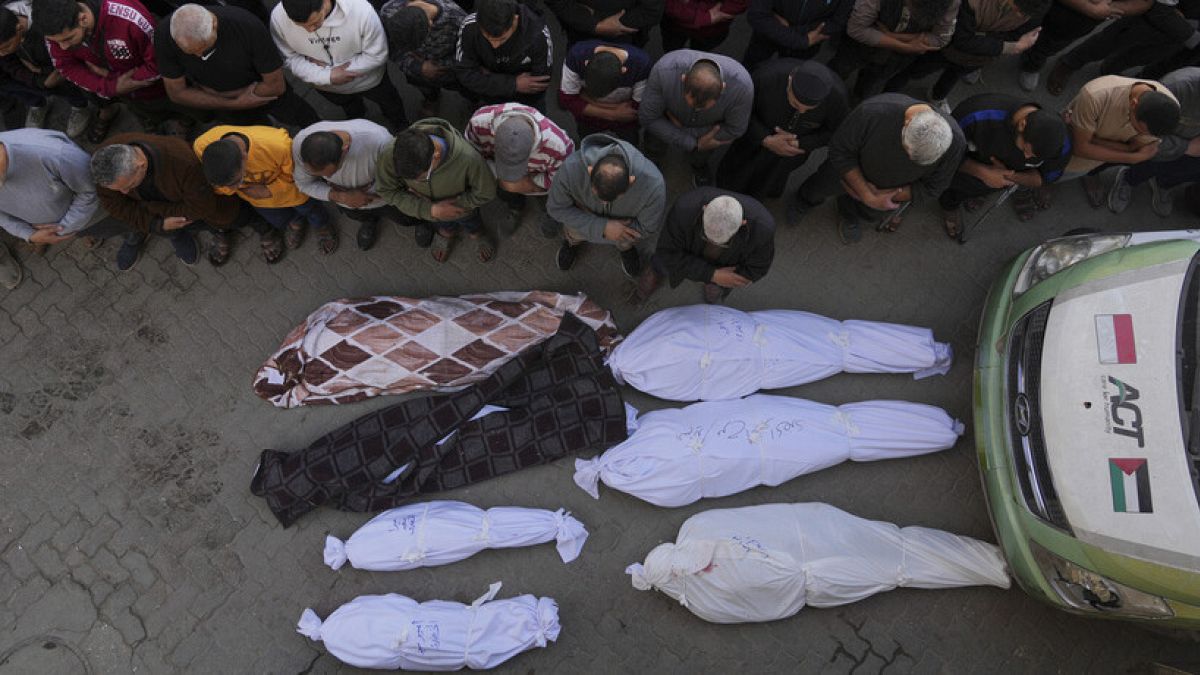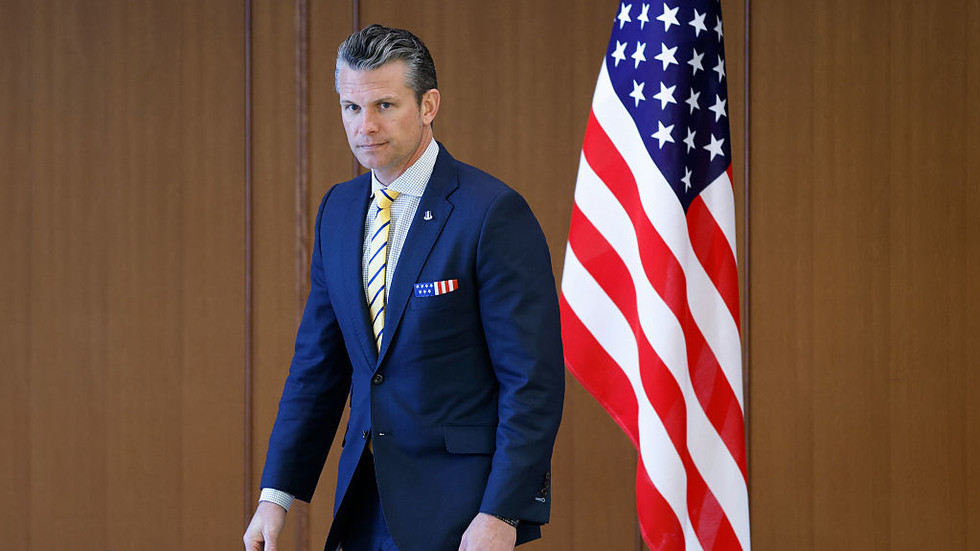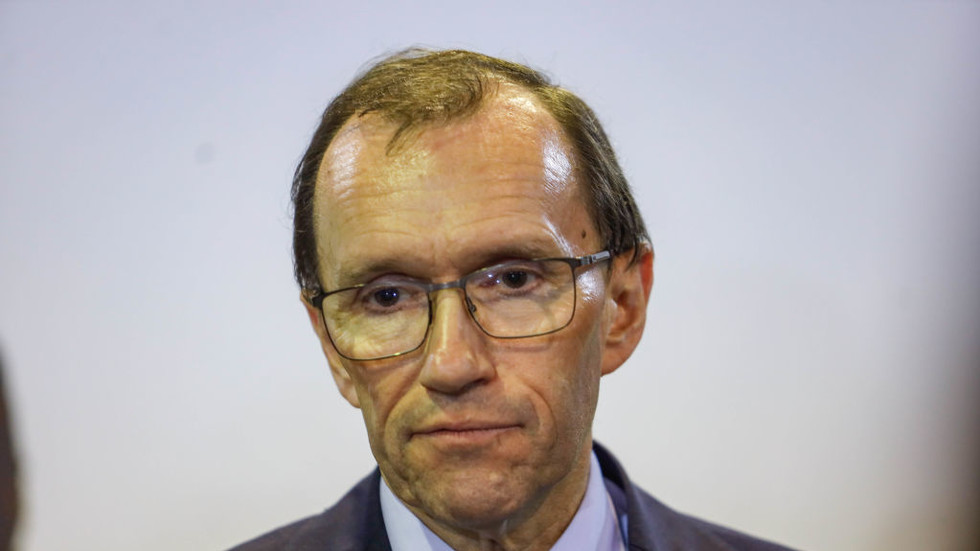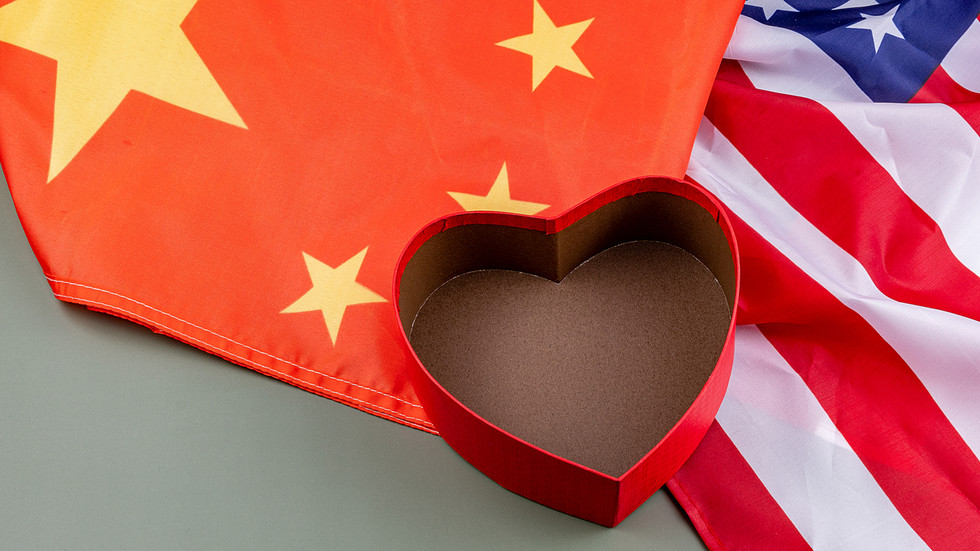A massive drop in Arab Americans' support helped cost Kamala Harris the presidency, but there is no guarantee Trump will be better for peace in the Middle East.
On 1 November, just a few days before the presidential election that has returned him to the White House, Donald Trump travelled to the crucial swing state of Michigan and stopped at a small Lebanese café in the town of Dearborn, near Detroit.
Flanked by security, press, and local Arab American voters, the once-and-future president signed a "peace plaque", then turned to reporters.
“You’re going to have peace in the Middle East,” Trump promised, before the café’s owner Albert Abbas presented him with a plaque of his own “from all peace-lovingMichiganians”.
“It was a great experience. I don't think it could have gone any better,” Abbas told Euronews.
Four days later, Trump clinched victory in Dearborn and neighbouring towns which have the highest concentration of Arabs outside of the Middle East. InDearborn, he won 42% percent of the vote, where Vice President Kamala Harris captured only 36% — a spectacular collapse from the near 70% Biden won in 2020.
Nabih Berri, the speaker of Lebanon’s parliament who was instrumental as a go-between in ceasefire talks between Israel and Hezbollah, attributed Trump’s strong performance amongst Arab American voters in the key area to the cafévisit.
It all represents a major turnaround since Trump's first term, when he was chastised by American Muslim leaders in the strongest of terms for various actions.
During his first campaign, he suggested "a complete and total shutdown" on Muslims entering the US, and soon after his first inauguration in 2017, he signed an executive order banning entry from several Muslim-majority countries.
He later moved the US embassy to Jerusalem, a highly controversial step, and recognised Israeli sovereignty of the Golan Heights — this despite Israel's presence there being considered an illegal occupation under international law.
Yet times appear to have changed.
‘A very genuine individual’
Dressed in black jeans, black jumper, and a black cap, Abbas — whose father took part in Lebanese peace negotiations in the 1980s — talked to Euronews about how Trump’s visit came to fruition, along with his colleague Faye Nemer, director of the MENA-American Chamber of Commerce (MENAACOC). The two said that the Trump campaign first reached out to them in September.
“We consider it an iconic meeting,” says Nemer, adding that the Trump team had been “very receptive” to their concerns about Israel’s actions in the Middle East and the need for a ceasefire.
Nemer grew up in Lebanon during the 1982 Israeli invasion of Southern Lebanon. Her family was displaced and ended up in a cramped, abandoned office building in Beirut before moving to the US.
She described watching tanks and fearing for her family's life, and her own.
“I realised that my childhood was a traumatic one, and it wasn't a normal childhood.” It was, she said, “something no child should experience”.
Nemer believes Trump understands this.
“We saw the sincerity in his platform, we saw the sincerity in his approach. He was a very genuine individual, very committed to ensuring peace in the region,” she tells Euronews.
Soon after visiting Abbas’ café, Trump held a rally close by where an Imam endorsed the Republican nominee. Pointing at Trump, Imam Belal Alzuhairi said, “there is bloodshed all over the world, and this man can make it stop.”
The Imam is from nearby Hamtramck, the US’s first Muslim-majority city, in which Trump more thantripled his vote share from 2020.
Asked by Euronews about Trump’s past relations with Muslim Americans, he replied: “We like to hope for the best and maintain positive expectations rather than focusing on the past.”
Buyer’s remorse
There are already signs that the relative warmth that greeted Trump during the campaign may not last.
Within days of re-taking the White House, Trump announced a series of controversial political appointments who could have major implications for his Middle East policy.
His choice for UN ambassador, New York Congresswoman EliseStefanik, has repeatedly criticised the UN for being anti-Israel and called for the termination of the UN agency for Palestinians, UNRWA. More concerning still for pro-Palestinian advocates is Trump's putative ambassador to Israel, MikeHuckabee.
The former governor of Arkansas has previously referred to the occupied West Bank by its biblical name Judea and Samaria, a rhetorical device used by far-right Israeli politicians who lay claim to the territory, and has also said there is “no such thing” as the West Bank or even Palestinians — and described Trump approvingly as promoting the “most pro-Israel policies of any president in my lifetime”.
There are plenty of people who consider this cause for alarm.
Dr Burhan Ghanayem is a Palestinian American businessman and former scientist who co-founded the Arab Democratic Caucus in North Carolina. Speaking over the phone to Euronews between checking on the Subway sandwich store he manages, Ghanayem worried that many Arab Americans didn’t understand Trump’s threat to the community.
“Many people are too young to remember these people," he laments. "I mean, Huckabee.”
Ghanayem grew up near Nablus in the West Bank, and describes how he lost members of a “second family” of close friends in Gaza when their family’s building in Khan Younis was evacuated and destroyed by IDF soldiers this year.
“Two nephews went back to the house. They were just looking for valuables, some semblance of home, and the IDF shot them,” he tells Euronews.
His fears about Trump are largely based on the president-elect's first term.
“His last presidency was a disaster. He’s against us, he’s against Arabs."
The point was echoed by Khodr Zaarour, the founder of the Muslim American Public Affairs Council, who endorsed Green Party candidate Jill Stein after decades of endorsing Democrats.
“It's definitely worrying for us, not only us, the entire foreign policy establishment,” he said.
Nancy Okail, an Egyptian American human rights activist who has been sentenced to jail in absentia by Egyptian court, told Euronews she thought that Trump’s pick of property mogul Steve Witkoff as Middle East envoy was the “most interesting decision”, indicating as it did that the incoming president sees the region “as one giant real estate deal” — a view that she warned could further legitimise Israeli annexation efforts.
When directly asked about these developments, Abbas became more defensive.
"Let's let Donald Trump get into office before we judge him or his appointments. I think they will all come around and have a more balanced approach.”
A sobering outcome for Democrats
A common theme throughout the conversations was disillusionment with the Democratic Party, whose presidential ticket lost over50% of its previous support from Muslim and Arab American voters, according to one exitpoll.
Biden had also visited Abbas’ restaurant in 2020, and Nemer and Abbas reported that the Harris campaign came to meet with them in September, but that first thing they said is that there would be no shift in Middle East policy, something Abbas says left the community feeling like “lesser humans”.
It was only then that they started communicating with the Trump campaign.
Alzuhairi added that the party had “increasingly sidelined” Arab American voices. Even Ghanayem admitted that the Democrats “turned out to be a series of disappointments”, and accused Biden of “being completely complicit in genocide”.
While he voted for Harris, he said the Arab Caucus agonised over endorsing her, eventually refusing to do so.
Meanwhile, Abbas said some of those who backed Trump were aligned with conservative values already. For others, like Ghanayem and Okail, it was these values which, not just events in Israel, Lebanon and Palestine, that led them to vote for Trump.
“I'm an American citizen and I care about everything," concluded Okail. "I find it a little bit insulting that we're in a pigeonhole."
In the end, Ghanayam believes the Middle East conflict has caused deep disillusionment with all sides.
“People can’t think straight. There’s so much trauma.”

 3 months ago
34
3 months ago
34






 We deliver critical software at unparalleled value and speed to help your business thrive
We deliver critical software at unparalleled value and speed to help your business thrive






 English (US) ·
English (US) ·